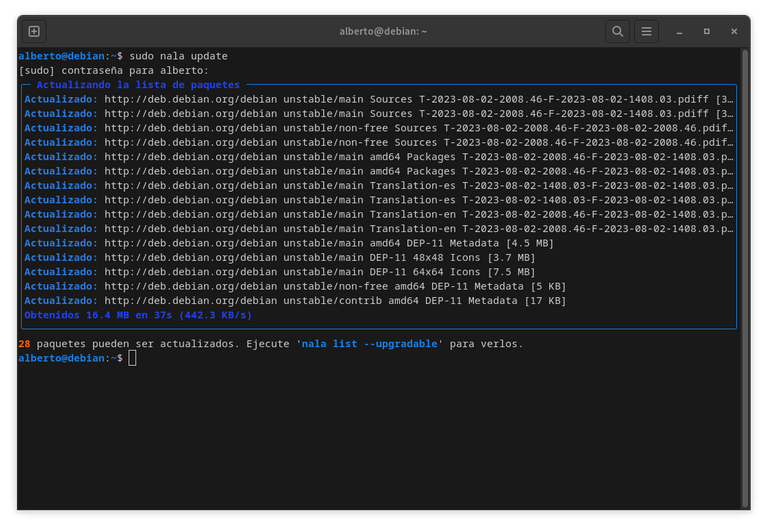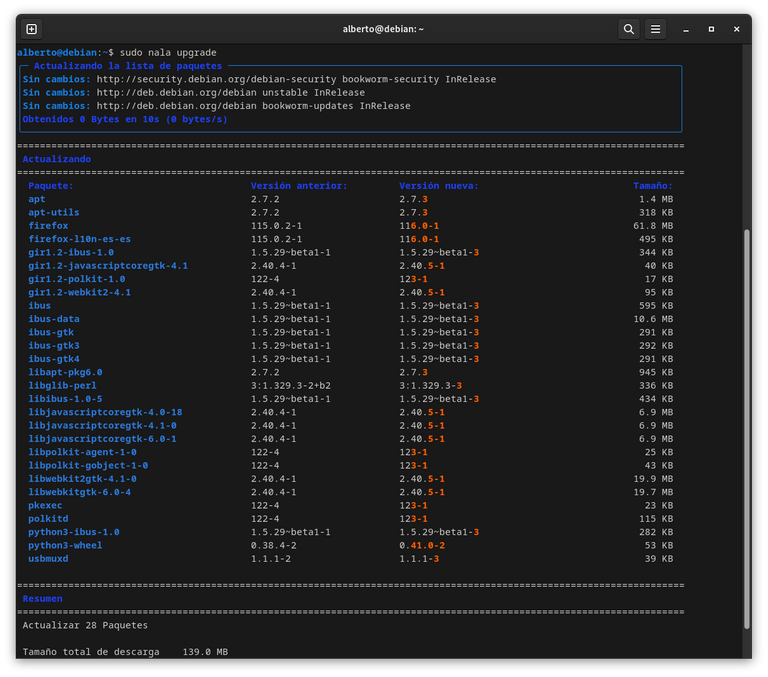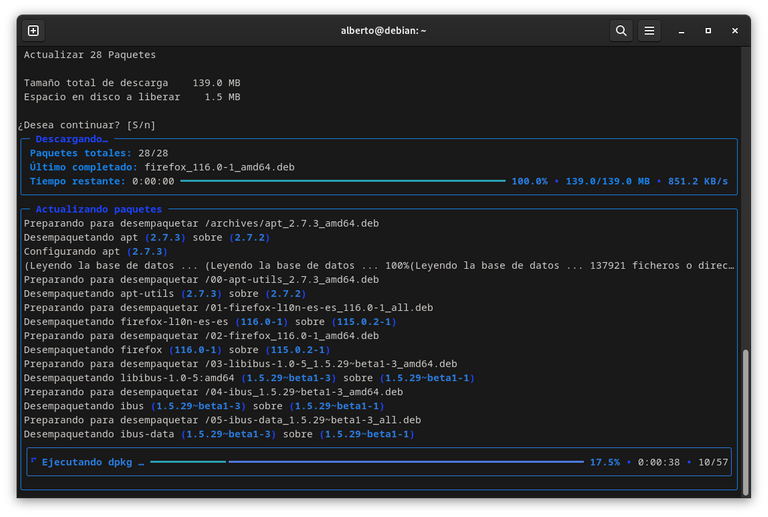¿Nala ha llegado para sustituir a APT? 🇪🇸 🇺🇸

Español
Las cosas han cambiado en los últimos años, al menos para algunos usuarios. GNU/Linux ha mostrado un gran desarrollo en el entorno gráfico para hacer un sistema más amigable y fácil de usar. Por supuesto, estamos hablando de Linux en el escritorio; del lado de los servidores, las cosas no han cambiado, y no creo que cambien en un futuro cercano.
Ahora bien, estamos los usuarios que disfrutamos del uso de la terminal. En este caso, hay dos razones importantes para mí: mayor control y menor consumo de recursos. La terminal tiene una gran cantidad de aplicaciones que hacen que cualquier entorno gráfico no sea indispensable.
Una de las cosas que más disfruto es actualizar el sistema y las aplicaciones desde la terminal, ya que puedo tener el control total y obtener información más completa sobre las versiones y los repositorios. Y es que APT y el formato de paquetes .deb, además de la filosofía, son lo que me tiene enamorado de Debian, entonces ¿por qué estoy hablando de sustituir a APT? APT es un sistema de gestión de paquetes que permite al usuario mayor facilidad de instalación, actualización, eliminación, obtener información de los paquetes, además de otras características y funciones útiles para la administración del sistema. Ahora hablaremos de Nala.
Nala es una interfaz de usuario para la terminal escrita en Python, liberada bajo la licencia de software libre GNU GPL v3.0 y su repositorio está alojado en GitLab. He leído en algunos blogs que Nala es un front-end de apt, lo que sugiere que por debajo usa APT, pero eso me confundió un poco. Sin embargo, en su propia documentación dice: Nota: Nala no usa APT para descargar y verificar paquetes. Nala está disponible en Debian, Ubuntu y sus derivados.
Para instalar Nala:
sudo apt install nala
Ahora bien, ¿qué tiene de especial Nala? Básicamente, puedes hacer lo mismo que haces con APT, pero la información la muestra de manera más organizada y atractiva a la vista. Toda la información está tabulada y ordenada, utiliza la librería colorama de Python para resaltar algunos aspectos importantes. Realmente es una bonita y útil manera de administrar nuestro sistema. Personalmente, estoy muy contento y contento con esta aplicación, y si sigue popularizándose dentro de la comunidad, su desarrollo puede continuar y podría terminar de destronar a APT.
Si eres usuario o no de Debian o de sus derivadas, me gustaría leer tu opinión y saber cuál es tu favorita. Muchas gracias por leer. Un abrazo.



English
Things have changed in recent years, at least for some users. GNU/Linux has shown great development in the graphical environment to make the system friendlier and easier to use. Of course, we're talking about Linux on the desktop; On the server side, things haven't changed, and I don't think they will in the near future.
Now, we are the users who enjoy the use of the terminal. In this case, there are two important reasons for me: more control and less resource consumption. The terminal has a large number of applications that make any graphical environment unnecessary.
One of the things I enjoy the most is updating the system and applications from the terminal, since I can have full control and get more complete information about versions and repositories. And it is that APT and the .deb package format, in addition to the philosophy, are what have me in love with Debian, so why am I talking about replacing APT? APT is a package management system that allows the user to easily install, update, remove, get package information, as well as other useful features and functions for system administration. Now we will talk about Nala.
Nala is a terminal user interface written in Python, released under the GNU GPL v3.0 free software license and its repository is hosted on GitLab. I've read on some blogs that Nala is an apt front-end, which suggests that it uses APT underneath, but that confused me a bit. However, in its own documentation it says: Note: Nala does not use APT to download and verify packages. Nala is available on Debian, Ubuntu and their derivatives.
To install Nala:
sudo apt install nala
Now, what is special about Nala? Basically, you can do the same thing you do with APT, but display the information in a more organized and visually appealing way. All the information is tabulated and ordered, it uses the Python colorama library to highlight some important aspects. It really is a nice and useful way to manage our system. Personally, I am very happy and happy with this app, and if it continues to catch on within the community, its development can continue and it could end up dethroning APT.
Whether or not you are a user of Debian or its derivatives, I would like to read your opinion and know which one is your favourite. Thanks so much for reading. A hug.
Mi intención con esta publicación es dar mi aporte al software libre y al código abierto, difundiendo al público en general todos los beneficios, ventajas y facilidades de obtener versiones seguras, optimas y de vanguardia.
Las imágenes son mías o capturas de pantalla tomadas por mí, a menos que se indiquen fuentes externas.
Discord: alberto0607
Sígueme en Twitter: [alberto0607](https://twitter.com/alberto_0607
Congratulations @alberto0607! You have completed the following achievement on the Hive blockchain And have been rewarded with New badge(s)
Your next target is to reach 150 posts.
You can view your badges on your board and compare yourself to others in the Ranking
If you no longer want to receive notifications, reply to this comment with the word
STOPTo support your work, I also upvoted your post!
Check out our last posts:
Thanks for your contribution to the STEMsocial community. Feel free to join us on discord to get to know the rest of us!
Please consider delegating to the @stemsocial account (85% of the curation rewards are returned).
You may also include @stemsocial as a beneficiary of the rewards of this post to get a stronger support.
Yay! 🤗
Your content has been boosted with Ecency Points, by @alberto0607.
Use Ecency daily to boost your growth on platform!
Support Ecency
Vote for new Proposal
Delegate HP and earn more
Click on the badge to view your board.
Thank you to our sponsors. Please consider supporting them.
Check out our last posts:
Click on the badge to view your board.
Thank you to our sponsors. Please consider supporting them.
Check out our last posts:
Click on the badge to view your board.
Thank you to our sponsors. Please consider supporting them.
Check out our last posts:
Click on the badge to view your board.
Thank you to our sponsors. Please consider supporting them.
Check out our last posts:
Click on the badge to view your board.
Thank you to our sponsors. Please consider supporting them.
Check out our last posts:
Click on the badge to view your board.
Thank you to our sponsors. Please consider supporting them.
Check out our last posts:
Click on the badge to view your board.
Thank you to our sponsors. Please consider supporting them.
Check out our last posts: